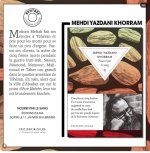tiganeasca
Moderator
I'm still fairly new to this site, but I've come up against an issue that seems fundamental to me and wonder what the best answer is.
We recently had a several post exchange in the "Recently Begun Books" thread about Egyptian literature. But when I went to see what there is on literature of other countries in the region from say, Tunisia to "Persia," I find boards for European, Asian & Oceanic, Americas, and African. Yes, I realize the search function is useful and helpful. But I wonder whether that portion of the world doesn't deserve its own board. Certainly there are differences within the various national literatures of Yemen and Libya, Iraq and Morocco. And yes, I realize that African technically comprehends Tunisia to Egypt. But I don't think many would think "European" when searching for Iranian or Iraqi literature. I think that Middle East, while perhaps not the best or most accurate category, might nevertheless be good enough and recognizable enough to use as a catch-all for these literatures.
This is not meant as a snide, "what was wrong with you?" kind of critique. It's a post that's a question.
We recently had a several post exchange in the "Recently Begun Books" thread about Egyptian literature. But when I went to see what there is on literature of other countries in the region from say, Tunisia to "Persia," I find boards for European, Asian & Oceanic, Americas, and African. Yes, I realize the search function is useful and helpful. But I wonder whether that portion of the world doesn't deserve its own board. Certainly there are differences within the various national literatures of Yemen and Libya, Iraq and Morocco. And yes, I realize that African technically comprehends Tunisia to Egypt. But I don't think many would think "European" when searching for Iranian or Iraqi literature. I think that Middle East, while perhaps not the best or most accurate category, might nevertheless be good enough and recognizable enough to use as a catch-all for these literatures.
This is not meant as a snide, "what was wrong with you?" kind of critique. It's a post that's a question.

:quality(70)/cloudfront-eu-central-1.images.arcpublishing.com/thenational/FNLSGPPSPUWIQGWDD3XWS2FMDI.jpg)
:quality(70):focal(960x410:970x420)/cloudfront-eu-central-1.images.arcpublishing.com/thenational/TFTACOZY3RF7RMYOPAIZ3KXYZQ.jpg)

:quality(70)/cloudfront-eu-central-1.images.arcpublishing.com/thenational/3GIIJ2IOJRFFHEM5GY2JNYPXGU.JPG)
